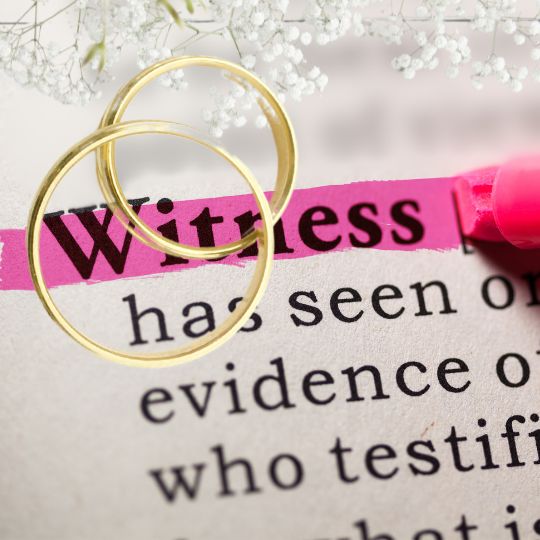Being a Witless Witness is
not an option!
Categories: | Wedding Legals |
 I get it. The
legal side of planning your wedding isn't the most
exciting aspect. But it is crucial. And you, and
your celebrant, must get it 100% right to make
sure that the validity of your marriage is never
questioned.
I get it. The
legal side of planning your wedding isn't the most
exciting aspect. But it is crucial. And you, and
your celebrant, must get it 100% right to make
sure that the validity of your marriage is never
questioned.In Australia, legal witnesses play a vital role in the legitimacy of every marriage. This is in line with the role of witnesses throughout the Australian legal system.
A marriage must be witnessed in order to ensure that the it is given the full recognition, oversight, and protection of the law.
Not surprisingly, then, I'm more than somewhat disturbed when I hear reports of witnesses being appointed AFTER the marriage ceremony is done and dusted, but just in time to sign the certificates.
What is a Witness
A witness is a person who has information
(evidence) which may be useful in a case being
heard in a Court.
There are two types of witnesses. Witnesses of
Fact, and Expert Witnesses.
The two legal witnesses required by the
Marriage Act to be present at a Marriage
Ceremony are Witnesses of Fact, people who can
testify as to what they saw and heard during the
ceremony, and possibly before and after.
It therefore stands to reason that
- as a witness you consented to be a witness, and
- you understood that you needed to be present for the whole ceremony, paying attention to what was said and done!
The word witness, which comes
from the Old English term witnes,
meaning “knowledge” or “understanding", has been
in use in English for nearly 1100 years, without
any change to its meaning.
Your wit is your perception and expression of something, so witness means “to have wit about something.” In this case, about the marriage. In order to be able to give evidence in court, the witnesses to a marriage must be able to give testimony under oath (or having made an affirmation that you will tell the truth).
- That they were aware that they were the legal witnesses to the marriage, and
- Describe what exactly they saw and heard happen.
Do witnesses witness
the couple's signatures?
Who can be a witness?
That means that you must be
- At least 18
- Not under the influence of any substance, legal or otherwise (so not drunk, stoned, or compromised by prescribed medication)
- Capable of understanding the ceremony - if language is an issue, an official Interpreter must be used
But you are not required to be an Australian
Citizen or Resident. Nor is there any
restriction on members of your family, or even
strangers, being your witnesses
What about Witness
Lotteries or Surprise Witnesses
Witnesses lotteries, where you pull names out
of the hat to choose your witnesses, are
immense fun, and not only add a bit of
cheekiness to a wedding, leaning into the
familiar ritual of the lucky door prize, but
can be a good way of sidestepping the
considerable drama that witness choice can
create.
But here's the thing. This must be done
before the wedding ceremony proper gets
underway. That can be after the
processional, when the wedding party is in
place up the front, but must be before the
first formal words that signal the start of
the ceremony are spoken.
If the witnesses are chosen after the vows
have been said, the validity of the marriage
is questionable. Nobody wants that. So it is
important to get it right.
As for surprise witnesses. That's fine too, but they must be told before the ceremony starts. One minute before is fine.
Where there are surprise witnesses, I talk to
them individually just before the start of the
ceremony. They are usually sitting in or near
the front row, which makes it easy. I also
check that they are OK with it. The reaction
is always elation and excitement. But once,
just once, a beloved grandparent declined on
the grounds that they didn't feel they could
do the role justice. We had expected that that
could be the case, so had a reserve witness
chosen, who was thrilled.
When the names are pulled out of the hat,
everyone gets to know who the witnesses are.
When they are surprise witnesses, I say a few
words at the start of the ceremony as to why
they have been chosen. Always some damp
hankies after that!
Related Information
